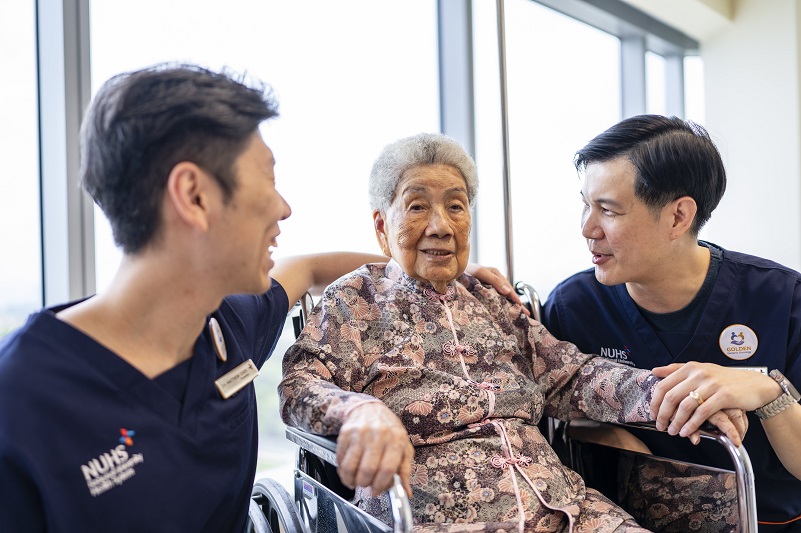As the nation grapples with increasing cancer diagnoses among its ageing population,
the NCIS Geri-Onco GOLDEN programme offers a holistic, personalised response,
giving cancer care for older adults a shot in the arm.
Issue 2 | September 2023

 Subscribe and ensure you don't miss the next issue!
Subscribe and ensure you don't miss the next issue!
Singapore is undergoing a significant demographic shift. The city-state's ageing population is not only growing but facing a surge in cancer diagnoses. The Singapore Cancer Registry's 2020 report provides evidence: between 1968 to 1972, 16.3% of cancer diagnoses were among individuals 70 and older. From 2016 to 2022, that number had risen sharply to 38.2%.
The data reveals more than a hike in cases; it also reveals a rise in median age at diagnoses, from 58.7 years to 66 years over the same periods. This trend aligns with the global pattern of an ageing population and puts the spotlight on the connection between age and cancer - emphasising the need for specialised care for older adults within Singapore's healthcare system.
The GOLDEN programme's role in Singapore's healthcare
In response to the increasingly complex needs of older adults, the National University Cancer Institute, Singapore (NCIS) rolled out the NCIS Geri-Onco GOLDEN programme in 2019. A partnership with Ng Teng Fong General Hospital and supported by a five-year grant from the JurongHealth Fund since 2019, this unique initiative focuses on patients with cancer aged 65 and above. Since its inception, it has catered to over 1,400 individuals.
The GOLDEN programme takes a holistic view of care for older adults with cancer. Combining expertise from oncology, geriatric medicine, and allied health, the programme ensures that patients receive tailor-made care plans considering their diverse needs, from multiple co-morbidities to functional limitations and potential cognitive impairments.
"Two individuals of the same age may have completely different health and mental states leading to different needs. This is why we need a comprehensive assessment of the patient rather than focus on the specific illness itself, and to formulate a management plan tailored to their needs" says Dr Matthew Chen, consultant at the Division of Geriatric Medicine, Department of Medicine, National University Hospital (NUH), capturing the programme's philosophy.
Going the extra mile
The creators of the GOLDEN programme understand that older patients require a nuanced approach to treatment. Instead of solely relying on traditional metrics, the programme administers the Geriatric 8 questionnaire to new patients, leading to comprehensive assessments in areas ranging from food intake to mobility. Before any treatment, patients are also subjected to an evaluation that covers various domains such as cognition, nutrition, and social support - a foundation for creating personalised treatment plans tailored to everyone' s unique needs.
One tangible benefit is the significant reduction in the number of clinic visit. Leveraging telemedicine, especially during the COVID-19 pandemic, the programme streamlines the process by interviewing patients or caregivers via phone or video calls before their visits. This allows for enhanced communication, rapid addressing of concerns, and immediate adjustments to treatment plans.
Complementing the programme is the Management and Innovation for Longevity in Elderly Surgical Patients (MILES) initiative, which optimises peri-operative care for those undergoing major elective surgery. "With MILES, patients receiving surgery can anticipate coordinated care across surgical, geriatric, and oncology teams within the GOLDEN framework, enhancing clinical outcomes and, in many cases, improving fitness for chemotherapy," says Associate Professor Alfred Kow, head and senior consultant at NUH' s Division of Hepatobiliary and Pancreatic Surgery, Department of Surgery, who is also the clinical lead of MILES programme.
The effectiveness of the GOLDEN programme is evidenced by a study involving 777 patients. Post-assessment, 61% of the patients changed their cancer treatment plans, with most opting for options with fewer associated risks.
Moreover, the programme doesn' t stop at medical care - it also provides support for various other needs. "For instance, 70% of patients received psychosocial and financial support, while nearly half were given nutrition advice, and many others with exercise recommendations and fall prevention techniques," says Dr Angela Pang, a visiting consultant with the Department of Haematology-Oncology at NCIS. Dr Pang was the principal lead of the GOLDEN programme. "Out of the patients who completed a satisfaction survey, an overwhelming 73% felt they benefited from the programme."
The future is GOLDEN
Older patients with cancer like Mdm Tan Yong Yuat, who, at 97, was diagnosed with stage 4 colorectal cancer, has found solace and strength in the GOLDEN programme. Through detailed assessments and collaborative efforts from dietitians and physiotherapists, Mdm Tan underwent surgeries successfully and enjoyed an optimised post-operative recovery.
As Singapore' s ageing population grows, such medical initiatives are poised to become pillars of the nation' s healthcare framework, ensuring that everyone, regardless of age, receives the best cancer care possible.
Dr Chen, who is the geriatric medicine lead for the GOLDEN programme at NUH, highlights this multi-dimensional approach, "Our team' s comprehensive approach takes into consideration not only the physical health of older patients with cancer but also their psychosocial and functional needs. This enables us to identify and manage potential risks or undiagnosed conditions. It' s more than aiding oncologists in treatment decisions - it' s about kick-starting broader conversations on combatting cancer as a collective endeavour more effectively."
Like this article? Simply subscribe to make sure you don't miss the next issue of EnvisioningHealth!




















